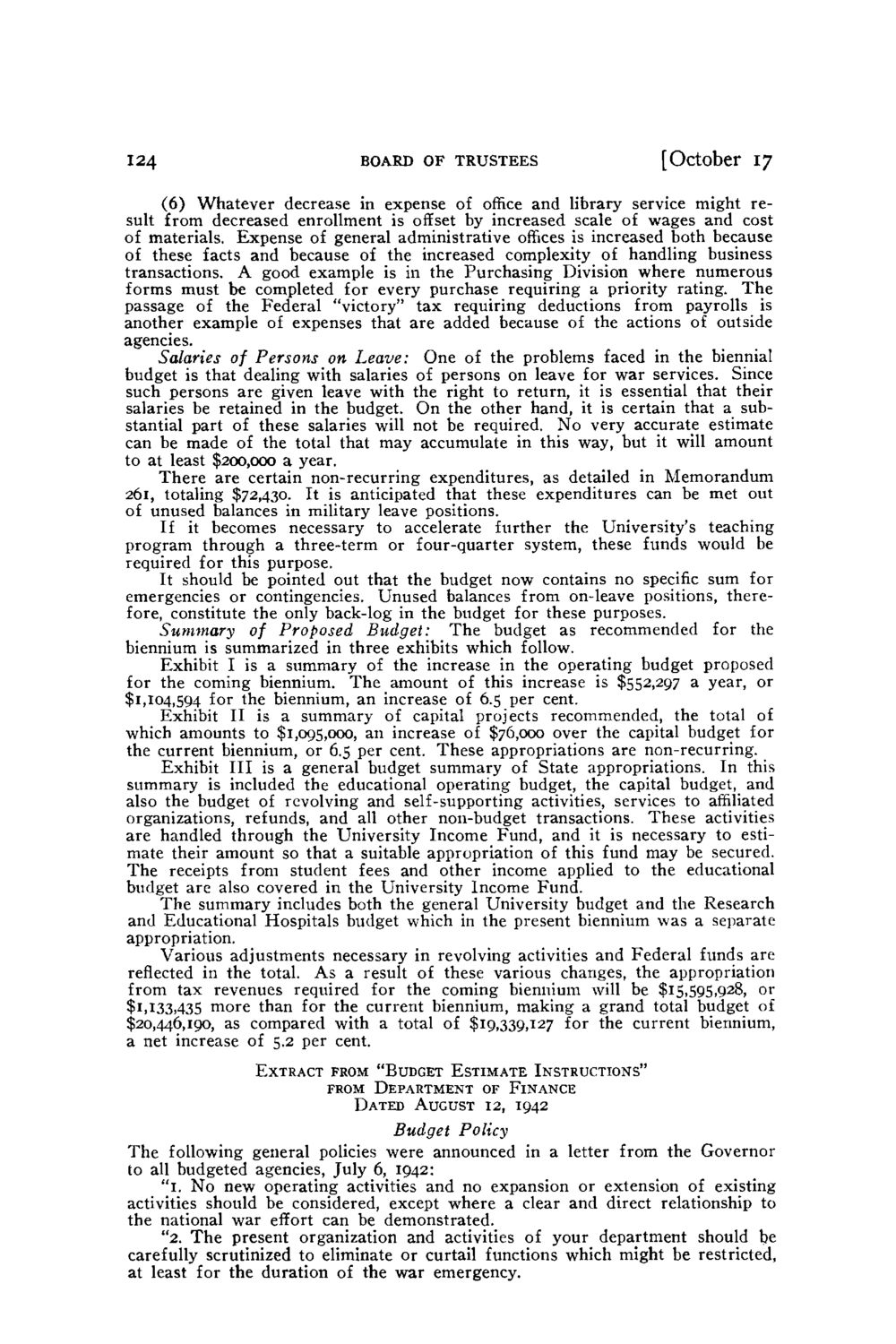| |
| |
Caption: Board of Trustees Minutes - 1944
This is a reduced-resolution page image for fast online browsing.

EXTRACTED TEXT FROM PAGE:
124 BOARD OF TRUSTEES [October 17 (6) Whatever decrease in expense of office and library service might result from decreased enrollment is offset by increased scale of wages and cost of materials. Expense of general administrative offices is increased both because of these facts and because of the increased complexity of handling business transactions. A good example is in the Purchasing Division where numerous forms must be completed for every purchase requiring a priority rating. T h e passage of the Federal "victory" tax requiring deductions from payrolls is another example of expenses that are added because of the actions of outside agencies. Salaries of Persons on Leave: One of the problems faced in the biennial budget is that dealing with salaries of persons on leave for war services. Since such persons are given leave with the right to return, it is essential that their salaries be retained in the budget. On the other hand, it is certain that a substantial part of these salaries will not be required. No very accurate estimate can be made of the total that may accumulate in this way, but it will amount to at least $200,000 a year. T h e r e are certain non-recurring expenditures, as detailed in Memorandum 261, totaling $72,430. It is anticipated that these expenditures can be met out of unused balances in military leave positions. If it becomes necessary to accelerate further the University's teaching program through a three-term or four-quarter system, these funds would be required for this purpose. It should be pointed out that the budget now contains no specific sum for emergencies or contingencies. Unused balances from on-leave positions, therefore, constitute the only back-log in the budget for these purposes. Summary of Proposed Budget: T h e budget as recommended for the biennium is summarized in three exhibits which follow. Exhibit I is a summary of the increase in the operating budget proposed for the coming biennium. T h e amount of this increase is $552,297 a year, or $1,104,594 for the biennium, an increase of 6.5 per cent. Exhibit II is a summary of capital projects recommended, the total of which amounts to $1,095,000, an increase of $76,000 over the capital budget for the current biennium, or 6.5 per cent. These appropriations are non-recurring. Exhibit I I I is a general budget summary of State appropriations. In this summary is included the educational operating budget, the capital budget, and also the budget of revolving and self-supporting activities, services to affiliated organizations, refunds, and all other non-budget transactions. These activities are handled through the University Income Fund, and it is necessary to estimate their amount so that a suitable appropriation of this fund may be secured. The receipts from student fees and other income applied to the educational budget are also covered in the University Income Fund. T h e summary includes both the general University budget and the Research and Educational Hospitals budget which in the present biennium was a separate appropriation. Various adjustments necessary in revolving activities and Federal funds are reflected in the total. As a result of these various changes, the appropriation from tax revenues required for the coming biennium will be $15,595,928, or $ I JI33>435 more than for the current biennium, making a grand total budget of $20,446,190, as compared with a total of $19,339,127 for the current biennium, a net increase of 5.2 per cent. EXTRACT FROM "BUDGET E S T I M A T E INSTRUCTIONS" FROM DEPARTMENT OF F I N A N C E DATED AUGUST 12, 1942 Budget Policy T h e following general policies were announced in a letter from the Governor to all budgeted agencies, July 6, 1942: " 1 . No new operating activities and no expansion or extension of existing activities should be considered, except where a clear and direct relationship to the national war effort can be demonstrated. "2. T h e present organization and activities of your department should be carefully scrutinized to eliminate or curtail functions which might be restricted, at least for the duration of the war emergency.
| |